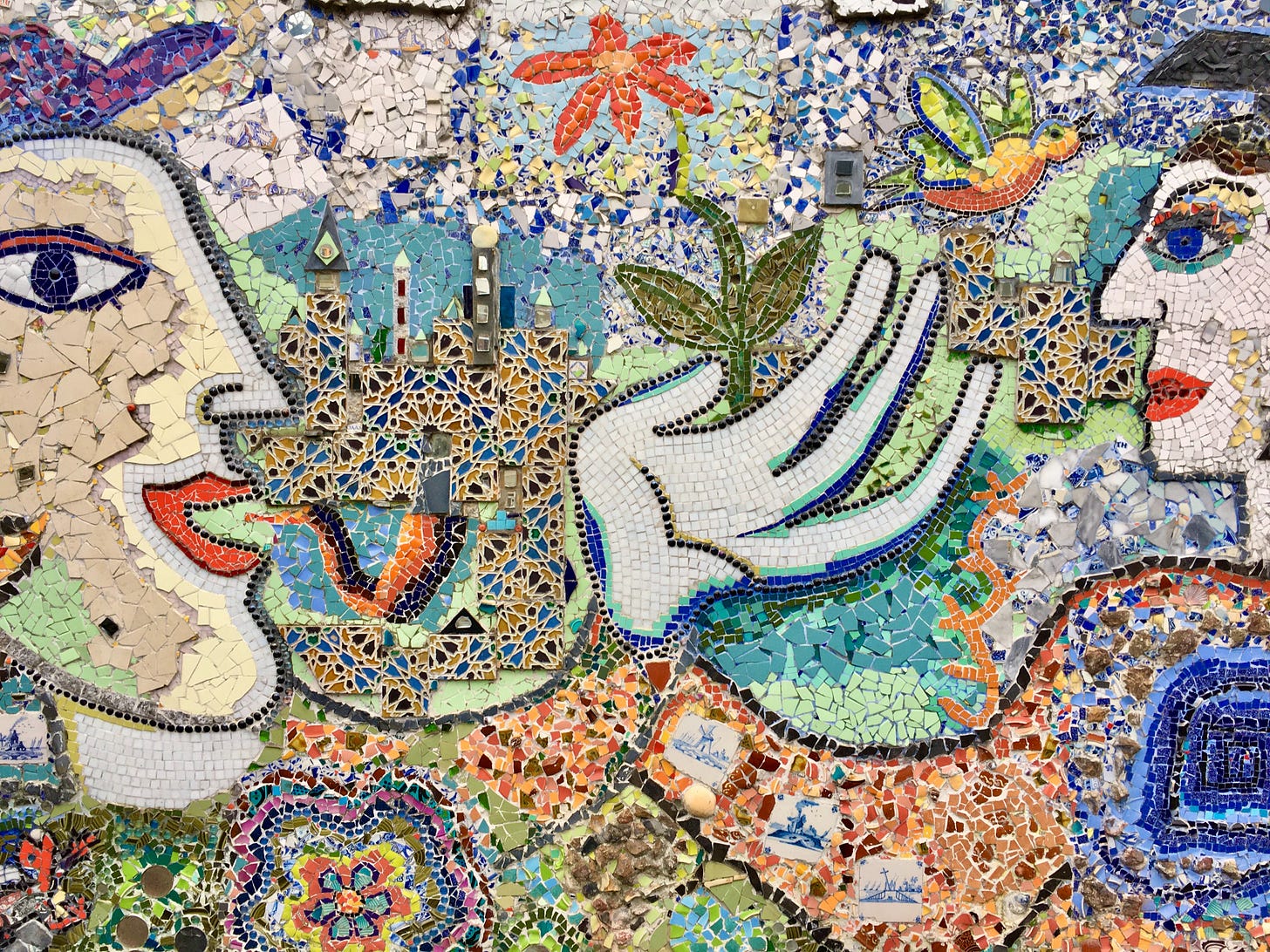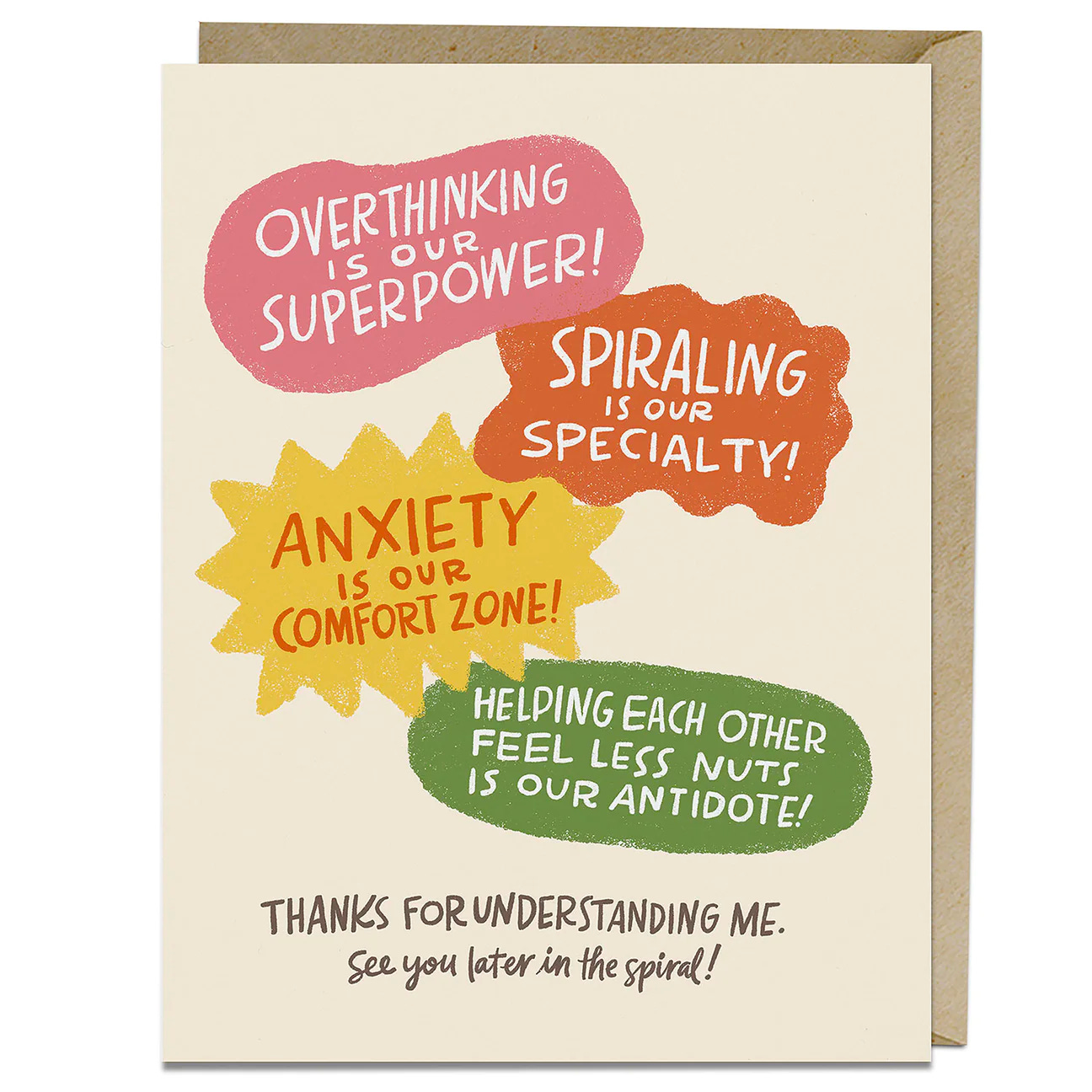On sensitivity: our most popular resource guide
It's not just "in your head" -- you really do need a break.
Note: This week, Meredith and I are both taking some time off to be with our families before the school year begins here, in the Northeast U.S. So, below, I’m excerpting some sections from our most popular resource roundup to date: a list of links and recs on being “sensitive.” We hope it inspires you too to give less f@#$s and take more breaks this week!
Sensitivity is a hot topic in the summertime when it comes to caregiving. We may have more “sensitive” children who melt down more easily as the temperatures rise, and struggle to co-regulate with them. We may be more “sensitive” ourselves, and wonder why we’re slowly receding into the couch as summer wanes, while other more extroverted caregivers are heading out on another epic daytrip or vacation.
Whether you identify as “sensitive” or not, may this resource guide below offer you some food for thought about what it might mean to affirm your needs and experiences without judgement, rather than wishing things were different. This could look like caring less about:
Being “tough” instead of asking for what you need.
Being “productive” before you rest.
Being “fine” instead of letting yourself cry.
If you feel so called, please feel free to drop your f@#$s about this in our subscriber chat.
“We’re not an evolutionary accident, but an adaptation. We are not what you think we are. We are useful, valued, loved. We’re the scientists and artists, the dreamers and the engineers. We’re vital to all of it.”
—Katherine May

The notion of some individuals within a population being more sensitive to inner/outer stimuli than others is not particularly new or trendy. Indigenous communities have long noticed these traits in some of their community members. Many have prized these traits. They simply had their own ways of naming and cultivating those traits in individuals for the greater good.
Within the world of Western science, however, the data being generated to back up these longstanding observations is changing daily. Since the ‘90s, and especially since the 2010s, we’ve learned a lot more about the mechanics of sensitivity and are still working towards diagnostic tools that better define its parameters. These methodologies are not perfect, but they do offer worthwhile food for thought.
Being able to name our differences as diagnoses can offer us a sense of connection and relief — finally, my story makes sense. However, labels don’t work so well when they are imposed on us from the outside, when they are used to exclude or “bad other” us, or when people engage in gate-keeping around whether or not we “really” meet the criteria to claim them. When exploring each resource below, I encourage you to note how each creator self-identifies (or doesn’t) vis a vis the topic of sensitivity, and to follow their lead when and if you choose to engage with them directly. (For example,
of uses “atypical” because that is the terminology her child prefers.)And, not all people who experience sensory processing sensitivity have an associated diagnosis, such as autism or ADHD. They are not synonymous. It is true that folks with autism spectrum disorder (ASD) and ADHD are often very sensitive to environmental stimuli, as you’ll see from the list of brilliant writers cited below — but that is not the only defining trait of those diagnoses. Meanwhile, sensitivity is a trait possessed by many who do not meet the criteria for any formal diagnosis. And many people who might meet the criteria still choose not to pursue formal diagnoses for reasons that range from the financial to the philosophical. It’s nuanced.
People may also experience their inner/outer sensitivity differently than you do. You may have the kind of sensitivity that can be easily “masked,” or you may be a neurodivergent person who cannot “pass” as neurotypical, and find daily functioning inside of many classroom and workplace spaces to be very difficult due to your sensitivity. My hope is that we can use these resources below to better advocate for spaces that are inclusive for all levels of sensitivity, not just our own.
On Substack: Writers Writing on Sensitivity
My go-to mom friend on this topic is
, whom we interviewed here. She emphasizes how important it is to embrace the both/and of having an atypical or “sensitive” kid, and to be honest about it: “Not many people are open about how hard parenting neurodivergent kids can be. We don’t want to complain in case our kids think we don’t love them, but it’s hard precisely because we love them so much, and we see how cruel and ableist this world can be. We don’t know how they’ll survive when we’re gone, so we fight for their rights until our knuckles are bloody, but it never feels like enough. If we can’t be vulnerable and honest about these struggles, how will others know we need help?”Dr. Genevieve von Lob offers this sage advice to those of us neurodivergent adults who wonder why we don’t feel or perform “like other parents”: Comparing ourselves with others is part of an old programming of competition, individualism and striving that leads inevitably to burn-out. Instead, we can acknowledge that we each have something unique to contribute. If you find yourself comparing, take a deep breath and then spend a few moments considering some of your own individual gifts and strengths. You’re worth a lot more than your mind likes to tell you.
Sensitive parents often have sensitive children — a combo both tough and beautiful. Julia McGarey recently launched The Lifeline to address this combo. Her recent manifesto on why the world doesn’t need more well-behaved kids had me pumping my fist in agreement: “We don't ask the ocean to be anything but the ocean. Asking children to be well-behaved, always helpful, or always choose the bright side is harmful. To them, to our relationship with them, to the future of our world. I want to see kids who take against injustice, who know how to ride the waves of their feelings instead of trying to contain them… Which means I have to be comfortable with a little bit of chaos.”

On Substack: Relevant Reads for Sensitive Readers
I appreciate the way
seeks out experts who can speak to the experience of neurodivergent parents and/or children. I also love Dr. Goodwin’s book for kids, on heavy rotation in my house, that helps sensitive kids learn not to hit others when they’re having big feelings.Kathleen Smith of The Anxious Overachiever writes concise, actionable posts ideal for sensitive people who tend to sponge up the feelings of everyone the room. This recent post on letting people be disappointed was a helpful reminder for me, and to anyone else who feels the heavy burden of trying to make every online and offline space as inclusive as possible.
Anne Helen Petersen needs no introduction on Substack, but I want to call out in particular her work in Culture Study on exploring the “leisure gap” between men and women. A hallmark feature of sensitive parents is that they can be as good or better at parenting than non-sensitive people, but they need more breaks. Yet men in hetero partnerings routinely receive more than women. When we deprive 50% of the highly sensitive parents in our midst of getting what they need to succeed, the effects for kids are not great, so we should all care more about evening the playing field here (slight pun intended).
Off Substack: Links & recs
The work of Dr. Elaine Aron has come under valid critique by autistic people who do not feel her words represent their lived experience. We stand with those people and encourage folks to rely more on recent data and first-person accounts vs. Aron’s now-dated work. That said, her work is seminal in this field and folks may still find some of her practical advice helpful. This is her website, which features the simple tools she has developed to help people self-assess for sensitivity. She is also one of the first writers to tell sensitive parents to take more breaks, at a time when other folks were exhorting them to lean in, and I’m grateful for the precedent this set.
This concise read in the NYT is a great 101-level resource on sensitivity to send to those who may be unfamiliar with the terminology or research cited above.
Similarly, this NPR interview with Dr. Thomas Boyce lays out the differences between sensitive and less-sensitive children in a helpful way.
The Soulful & Sensitive Podcast has the perfect explanation of how to live with a sensitive partner if you are not particularly sensitive yourself.
For a deeper dive: Dr. Michael Pluess, a leading researcher in this field, broke this topic down engagingly on Your Parenting Mojo.
ADDitude Mag is a great resource for understanding neurodiversity in general, and the difference between sensory processing sensitivity and ADHD in particular. Highly recommended for partners and parents of sensitive people.
Susan Cain, author of Quiet and Bittersweet, has written great resources for raising sensitive children and helping them to claim their gifts.
Katherine May’s most recent book, The Electricity of Every Living Thing, explores her relationship to her sensory sensitivity, as well as her late-breaking understanding of herself as a person with autism. Her sentiments on being a person with autism, quoted above, may ring true for many.
Self-compassion meditation is essential for sensitive people, who so often receive the message from our culture that we are both too much and not enough. Kristen Neff’s research-backed findings and meditations on the importance of self-compassion have been life-changing for me.
Subscriber Kat Geddes, who has a son with ADHD, strongly recommends @thechildhoodcollective, helmed by two child psychologists and a SLP who specialize in ADHD. “They do so well at explaining things, encouraging parents, and teaching you to advocate for your kids. They have two awesome online courses, but even without purchasing those their blog and Instagram account teach you so much!”


Thanks for the mention. I LOVE this list!
Honestly, Dr. Becky’s Good Inside and especially her membership are full of resources for parents. She calls them DFK: deeply feeling kids. There’s some controversy over this because she created her own label while saying she isn’t a fan of labels, but the tools are founded in NVC & IFS and the community is magical. Especially the neurodivergent kids room, where some incredible experts with lived experience chime in. I led a neurodivergent parents club in the community in the spring and wow. 🤩